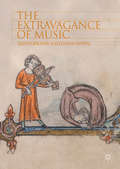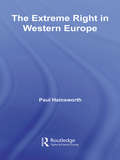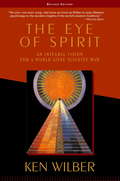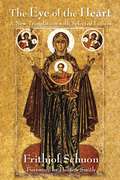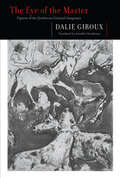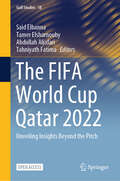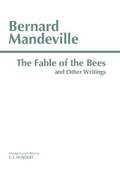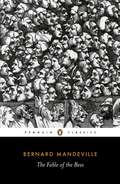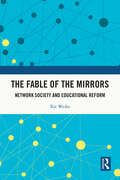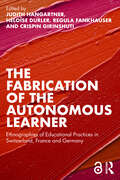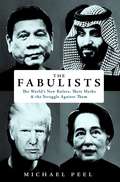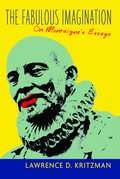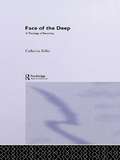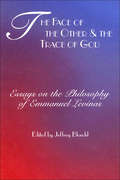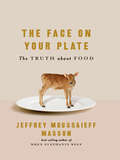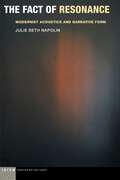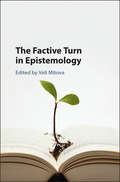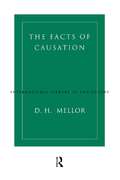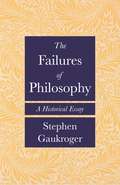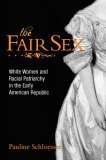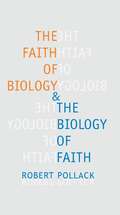- Table View
- List View
The External World and Our Knowledge of It
by Fred WilsonDavid Hume is often considered to have been a sceptic, particularly in his conception of the individual's knowledge of the external world. However, a closer examination of his works gives a much different impression of this aspect of Hume's philosophy, one that is due for a thorough scholarly analysis. This study argues that Hume was, in fact, a critical realist in the early twentieth-century sense, a period in which the term was used to describe the epistemological and ontological theories of such philosophers as Roy Wood Sellars and Bertrand Russell.Carefully situating Hume in his historical context, that is, relative to Aristotelian and rationalist traditions, Fred Wilson makes important and unique insights into Humean philosophy. Analyzing key sections of the Treatise, the Enquiry, and the Dialogues concerning Natural Religion, Wilson offers a deeper understanding of Hume by taking into account the philosopher's theories of the external world. Such a reading, the author explains, is not only more faithful to the texts, but also reinforces the view of Hume as a critical realist in light of twentieth-century discussions between externalism and internalism, and between coherentists and foundationalists.Complete with original observations and ideas, this study is sure to generate debates about Humean philosophy, critical realism, and the limits of perceptual knowledge.
The Extravagance of Music
by David Brown Gavin HoppsThis book explores the ways in which music can engender religious experience, by virtue of its ability to evoke the ineffable and affect how the world is open to us. Arguing against approaches that limit the religious significance of music to an illustrative function, The Extravagance of Music sets out a more expansive and optimistic vision, which suggests that there is an ‘excess’ or ‘extravagance’ in both music and the divine that can open up revelatory and transformative possibilities. In Part I, David Brown argues that even in the absence of words, classical instrumental music can disclose something of the divine nature that allows us to speak of an experience analogous to contemplative prayer. In Part II, Gavin Hopps contends that, far from being a wasteland of mind-closing triviality, popular music frequently aspires to elicit the imaginative engagement of the listener and is capable of evoking intimations of transcendence. Filled with fresh and accessible discussions of diverse examples and forms of music, this ground-breaking book affirms the disclosive and affective capacities of music, and shows how it can help to awaken, vivify, and sustain a sense of the divine in everyday life.
The Extreme Right in Europe
by Paul HainsworthThe Extreme Right in Western Europe is a concise introduction to one of the most persistent facets of late twentieth-century history, politics and society. The legacy of the Nazi era and the increasingly unacceptable face of extremism all militated against the success of far right-wing parties after World War Two. Nevertheless, contemporary problems and the solutions offered to ever more difficult questions such as immigration, unemployment, and law and order have enabled extremist, nationalist and populist movements to emerge. Focusing on a range of countries including France, Italy, Germany, the UK, Austria, Belgium and the Mediterranean region, Paul Hainsworth: explores the concept of right-wing extremism discusses the varying success of extreme right political parties in Western Europe examines the policies and perspectives of these parties analyses the profile of the extreme right’s electorate assesses the impact of right-wing extremism on aspects of politics in contemporary Western Europe. This accessible and up-to-date analysis of this enduring movement in Western Europe is a must for courses in history, politics and European studies.
The Eye of Spirit: An Integral Vision for a World Gone Slightly Mad
by Ken WilberIn this groundbreaking book, Ken Wilber uses his widely acknowledged "spectrum of consciousness" model to completely rewrite our approach to such important fields as psychology, spirituality, anthropology, cultural studies, art and literary theory, ecology, feminism, and planetary transformation. What would each of those fields look like if we wholeheartedly accepted the existence of not just body and mind but also soul and spirit? In a stunning display of integrative embrace, Wilber weaves these various fragments together into a coherent and compelling vision for the modern and postmodern world.
The Eye of the Heart: A New Translation with Selected Letters
by Frithjof SchuonThis new edition of The Eye of the Heart, one of perennialist author Frithjof Schuon's earliest works, features a fully revised translation from the French original as well as over 50 pages of new material, including previously unpublished selections from the author's letters and other private writings. Also featured is a foreword by renowned religion scholar Huston Smith, an editor's preface, extensive editor's notes, a glossary of foreign terms and phrases, an index, and biographical notes.Schuon's perspective is that of the sophia perennis or &“perennial wisdom&”, which is capable of discerning the spiritual intentions behind religious doctrines, forms, and practices. The essays collected here cover a wide range of subjects, including the fundamental principles of spiritual symbolism, the enigmatic nature of evil, questions on the afterlife, and many invaluable insights concerning the integration of everyday activities into the spiritual life. Schuon also evokes the sacredness of creation and the message of beauty, which when seen with the &“eye of the heart&”, leads back to God.
The Eye of the Master: Figures of the Québécois Colonial Imaginary (Carleton Library Series)
by Dalie GirouxIn the Québécois political vision of the twentieth century, sovereignty became synonymous with mastery. French Canadians sometimes claimed solidarity with racialized and Indigenous peoples, yet they saw their liberation as a matter of taking their rightful place in the seat of the oppressors. The idea of mastery has prevented the Québécois from seeing that their liberation is bound up with that of other groups oppressed by colonial powers. The Eye of the Master confronts the missed opportunities for a decolonial version of indépendance in Quebec by examining the quest for mastery that has been at the root of every version of independence offered to the people of Quebec since the mid-twentieth century. Exploring political discourse, popular culture, and the family photo album, Dalie Giroux revisits the mythology of being “masters in our own house” and identifies the obstacles blocking a more comprehensive version of liberation based on solidarity. Drawing from the living forces of Indigenous thought and anti-racist, ecological, and feminist movements, Giroux envisions life without conquest, domination, exploitation, and surveillance. Making the case for a different future, beginning in the here and now, The Eye of the Master offers a major new intervention in contemporary political thought to Canadian readers and all those who imagine a different North America.
The Eye of the Sparrow
by Mark HowardEvery adult is the creation of a child. The Eye of the Sparrow is an adult novel about a child - a boy going off to summer camp. And it is a drama of spiritual liberation. Twelve-year-old David Ashton is trapped in the cynicism and negativity that have come to dominate man’s image of himself. He is convinced that he is destined to fail and that the instructors and students have it in for him. Yet his story becomes an intense struggle out of despair as, driven into the wilderness, David is compelled to face the destructive and creative power of his beliefs and the very meaning of life and death. . . A gripping, honest, and sometimes raw account of a boy’s painful inner struggle ... set against the backdrop of the wild and spirited beauty of the Okanagan.” — trish miller, BCLA Reporter
The FIFA World Cup Qatar 2022: Unveiling Insights Beyond the Pitch (Gulf Studies #18)
by Said Elbanna Tamer Elsharnouby Abdullah Aljafari Tahniyath FatimaThis open access book presents a collection of case studies to analyse the FIFA World Cup 2022 held in Qatar, which revealed several complex aspects related to global football – its organization, its community, its related power dynamics, and its socio-economic implications. Behind this mega event lay unspoken narratives about the difficulties of hosting this global tournament in Qatar. This book takes the reader on a journey along the numerous strands connected to this multifaceted event. The case studies excavate both the best practices and the challenges that public policymakers and institutions in Qatar encountered in organizing the FIFA World Cup, including the pressures from various stakeholders involved, including FIFA, the sponsors, the football fans, and the local residents of Qatar. One such case sheds light on the debate surrounding the linkage between government-spending and the subsequent economic impact of hosting such a mega sporting event. The collection also delves into nuanced discussions about volunteering behaviour. Several case studies approach the central questions of sustainability and related implications following the Qatar event. As the first football World Cup to take place in a Middle Eastern country, the case studies also spotlight the role of cultural differences and associated implications, such as nation branding. Relevant to sociologists, economists, business and marketing researchers, and sports studies researchers, this book is a unique compilation bringing together multiple interdisciplinary, critical perspectives on Qatar's FIFA experience – from within the region, and beyond.
The Fable of the Bees
by Bernard Mandeville E. J. HindertAlthough never censored, Bernard Mandeville's anonymously published The Fable of the Bees; or Private Vices, Public Benefits came to be regarded soon after its publication in 1723 as the Enlightenment's epitome of immorality. As a naturalistic account of the mechanisms that condition human desire and of the unintended stabilizing social consequences of self-interested action, it has since been recognized as one of the eighteenth century's most significant works of social theory.
The Fable of the Bees
by Bernard Mandeville Phillip HarthA physician with a particular interest in psychological disorders and satirist, Mandeville published versions of his notorious Fable of the Bees from 1714 to 1732. Each was a defence and elaboration of his short satirical poem The Angry Hive, 1705. The version of the Fable of 1723 and 1732 are the fullest defences of his early paradox that social benefit is the unintended consequence of personal vice. It is an argument that is generally held to lie behind Adam Smith's doctrine of the 'hidden hand' of economic development.
The Fable of the Mirrors: Network Society and Educational Reform
by Xie WeiheThis book examines the impact of network society on self-identity and education and proposes key tasks for transforming education in network society.Using the metaphor of the "mirror", the book describes the environment and changes in network society based on the internet and information technology. As the diversity and complexity of network society increases, people see more and more self-images in the large mirrors, leading to a variety of developmental orientations and self-identities, as well as more opportunities for objectification. However, this often leads to confusion as to which image in the mirror really represents oneself. This social framework, which forms the backdrop of modern education, poses new challenges for self-identity formation and educational development. The author emphasizes the role of education in constructing a new "mirror" that can lead children and young people to a better perception of themselves, and thus to self-identification and self-realization.The title will be of interest to scholars and students in the fields of educational theory and sociology of education, as well as general readers interested in topics related to network society, identity, and education.
The Fabrication of the Autonomous Learner: Ethnographies of Educational Practices in Switzerland, France and Germany
by Judith Hangartner Héloïse Durler Regula Fankhauser Crispin GirinshutiThis book provides a thorough and detailed analysis of how the figure of the ‘autonomous learner’ shapes educational practices. It unpacks the impact of current educational reform discourse that focuses on the individual pupil as a learner, while neglecting the social dimensions of classroom practices. In view of the yet unknown requirements of the knowledge economy, students are demanded to take more responsibility for their learning and to become self-reliant, independent, lifelong learners. In turn, teachers are asked to tailor education to the individual needs of their students and to foster their individual learning trajectories. Based on in-depth fieldwork and long-term observation of interactions in classrooms and other scholastic settings, scholars from three European countries – France, Germany and Switzerland – show how the translation of the figure of the ‘autonomous learner’ into classrooms is shaped by distinct cultural traditions. Chapters analyse teaching routines and conceptions of self-reliance involved in autonomy-oriented settings and discuss how these change the sociality of the classroom. They scrutinize how autonomy is used to differentiate between students and how it contributes to the reproduction of social inequality. The book brings into dialogue two neighbouring research traditions that research autonomous learning from a sociological perspective and which have largely ignored each other until now. In so doing, the contributions engage a critical perspective for a careful empirical analysis in order to better understand what is being done in the name of autonomy. Providing insight into the many facets of developing and nurturing self-standing pupils across various educational contexts, this is ideal reading for scholars in the field of education, as well as teachers and decision-makers across the educational sector.
The Fabulists: The World’s New Rulers, Their Myths and the Struggle Against Them
by Michael PeelDemagogues and authoritarians are flourishing in this modern age of political myth. They exploit our fears and fantasies. Exposing the fictions that these new rulers use to take and keep control has never been more urgent – and people risk their careers, liberty or even their lives to do so. In this revealing and richly reported book, international correspondent Michael Peel illuminates the surprising parallels between leaders, movements and their supporters who have thrived using potent but questionable stories. From Aung San Suu Kyi&’s Myanmar to Rodrigo Duterte&’s bloody drugs crackdown in the Philippines, and from Britain&’s struggle over Brexit to Syria&’s civil war, he probes the patterns in narratives that too often serve the interests of the chosen few. Above all, Peel shows the extraordinary and sometimes dangerous steps courageous people take to challenge these fabulists – and the treacherous paths they lead us down.
The Fabulous Imagination: On Montaigne's Essays
by Lawrence D. KritzmanThis is one of the few books on Montaigne that fuses analytical skill with humane awareness of why Montaigne matters. Harold Bloom, Sterling Professor of Humanities, Yale University; In this exhilarating and learned book on Montaigne's essays, Lawrence D. Kritzman contemporizes the great writer. Reading him from today's deconstructive America, Kritzman discovers Montaigne always already deep into a dialogue with Jacques Derrida and psychoanalysis. One cannot but admire this fabulous act of translation. -Helene Cixous Throughout his career, Lawrence D. Kritzman has demonstrated an intimate knowledge of Montaigne's essays and an engagement with French philosophy and critical theory. The Fabulous Imagination sheds precious new light on one of the founders of modern individualism and on his crucial quest for self-knowledge. -Jean Starobinski, professor emeritus of French literature, University of Geneva Michel de Montaigne's (1533-1592) Essais was a profound study of human subjectivity. More than three hundred years before the advent of psychoanalysis, Montaigne embarked on a remarkable quest to see and imagine the self from a variety of vantages. Through the questions How shall I live? How can I know myself? he explored the significance of monsters, nightmares, and traumatic memories; the fear of impotence; the fragility of gender; and the act of anticipating and coping with death. In this book, Lawrence D. Kritzman traces Montaigne's development of the Western concept of the self. For Montaigne, imagination lies at the core of an internal universe that influences both the body and the mind. Imagination is essential to human experience. Although Montaigne recognized that the imagination can confuse the individual, "the fabulous imagination" can be curative, enabling the mind's "I" to sustain itself in the face of hardship. Kritzman begins with Montaigne's study of the fragility of gender and its relationship to the peripatetic movement of a fabulous imagination. He then follows with the essayist's examination of the act of mourning and the power of the imagination to overcome the fear of death. Kritzman concludes with Montaigne's views on philosophy, experience, and the connection between self-portraiture, ethics, and oblivion. His reading demonstrates that the mind's I, as Montaigne envisioned it, sees by imagining that which is not visible, thus offering an alternative to the logical positivism of our age.
The Fabulous Imagination: On Montaigne's Essays
by Lawrence D. Kritzman"This is one of the few books on Montaigne that fuses analytical skill with humane awareness of why Montaigne matters."-Harold Bloom, Sterling Professor of Humanities, Yale University"In this exhilarating and learned book on Montaigne's essays, Lawrence D. Kritzman contemporizes the great writer. Reading him from today's deconstructive America, Kritzman discovers Montaigne always already deep into a dialogue with Jacques Derrida and psychoanalysis. One cannot but admire this fabulous act of translation."-Hélène Cixous"Throughout his career, Lawrence D. Kritzman has demonstrated an intimate knowledge of Montaigne's essays and an engagement with French philosophy and critical theory. The Fabulous Imagination sheds precious new light on one of the founders of modern individualism and on his crucial quest for self-knowledge."-Jean Starobinski, professor emeritus of French literature, University of GenevaMichel de Montaigne's (1533-1592) Essais was a profound study of human subjectivity. More than three hundred years before the advent of psychoanalysis, Montaigne embarked on a remarkable quest to see and imagine the self from a variety of vantages. Through the questions How shall I live? How can I know myself? he explored the significance of monsters, nightmares, and traumatic memories; the fear of impotence; the fragility of gender; and the act of anticipating and coping with death. In this book, Lawrence D. Kritzman traces Montaigne's development of the Western concept of the self. For Montaigne, imagination lies at the core of an internal universe that influences both the body and the mind. Imagination is essential to human experience. Although Montaigne recognized that the imagination can confuse the individual, "the fabulous imagination" can be curative, enabling the mind's "I" to sustain itself in the face of hardship. Kritzman begins with Montaigne's study of the fragility of gender and its relationship to the peripatetic movement of a fabulous imagination. He then follows with the essayist's examination of the act of mourning and the power of the imagination to overcome the fear of death. Kritzman concludes with Montaigne's views on philosophy, experience, and the connection between self-portraiture, ethics, and oblivion. His reading demonstrates that the mind's I, as Montaigne envisioned it, sees by imagining that which is not visible, thus offering an alternative to the logical positivism of our age.
The Face of the Deep: A Theology of Becoming
by Catherine KellerThis is a groundbreaking, highly original work of postmodern feminist theology from one of the most important authors in the field. The Face of the Deep deconstructs the Christian doctrine of creation which claims that a transcendent Lord unilaterally created the universe out of nothing. Catherine Keller's impassioned, graceful meditation develops an alternative representation of the cosmic creative process, drawing upon Hebrew myths of creation, from chaos, and engaging with the political and the mystical, the literary and the scientific, the sexual and the racial.As a landmark work of immense significance for Jewish and Christian theology, gender studies, literature, philosophy and ecology, The Face of the Deep takes our originary story to a new horizon, rewriting the starting point for Western spiritual discourse.
The Face of the Other and the Trace of God: Essays on the Philosophy of Emmanuel Levinas (Perspectives in Continental Philosophy)
by Jeffrey BloechlThe Face of the Other and the Trace of God contain essays on the philosophy of Emmanuel Levinas, and how his philosophy intersects with that of other philosophers, particularly Husserl, Kierkegaard, Sartre, and Derrida. This collection is broadly divided into two parts: relations with the other, and the questions of God.
The Face on Your Plate: The Truth About Food
by Jeffrey Moussaieff Masson"It's a challenge to create transformative moments with books, but [Masson] does it."--Susan Salter Reynolds, Los Angeles Times In this revelatory work, Jeffrey Moussaieff Masson shows how food affects our moral selves, our health, and our planet. Masson investigates how denial keeps us from recognizing the animal at the end of our fork and urges readers to consciously make decisions about food.
The Faces of Injustice
by Judith N. ShklarPonders such questions as: How can we distinguish between injustice and misfortune? and What can we learn from the victims of calamity about the sense of injustice they harbour? Shklar formulates a new political and moral theory of injustice.
The Fact of Resonance: Modernist Acoustics and Narrative Form (Idiom: Inventing Writing Theory)
by Julie Beth NapolinShortlisted, 2021 Memory Studies Association First Book AwardThe Fact of Resonance returns to the colonial and technological contexts in which theories of the novel developed, seeking in sound an alternative premise for theorizing modernist narrative form. Arguing that narrative theory has been founded on an exclusion of sound, the book poses a missing counterpart to modernism’s question “who speaks?” in the hidden acoustical questions “who hears?” and “who listens?”For Napolin, the experience of reading is undergirded by the sonic. The book captures and enhances literature’s ambient sounds, sounds that are clues to heterogeneous experiences secreted within the acoustical unconscious of texts. The book invents an oblique ear, a subtle and lyrical prose style attuned to picking up sounds no longer hearable. “Resonance” opens upon a new genealogy of modernism, tracking from Joseph Conrad to his interlocutors—Sigmund Freud, Frantz Fanon, W. E. B. Du Bois, William Faulkner, and Chantal Akerman—the racialized, gendered, and colonial implications of acoustical figures that “drift” through and are transformed by narrative worlds in writing, film, and music.A major synthesis of resources gleaned from across the theoretical humanities, the book argues for “resonance” as the traversal of acoustical figures across the spaces of colonial and technological modernity, figures registering and transmitting transformations of “voice” and “sound” across languages, culture, and modalities of hearing. We have not yet sufficiently attended to relays between sound, narrative, and the unconscious that are crucial to the ideological entailments and figural strategies of transnational, transatlantic, and transpacific modernism. The breadth of the book’s engagements will make it of interest not only to students and scholars of modernist fiction and sound studies, but to anyone interested in contemporary critical theory.
The Factive Turn in Epistemology
by Veli MitovaWhen you believe something for a good reason, your belief is in a position to be justified, rational, responsible, or to count as knowledge. But what is the nature of this thing that can make such a difference? Traditionally, epistemologists thought of epistemic normative notions, such as reasons, in terms of the believer's psychological perspective. Recently, however, many have started thinking of them as factive: good reasons for belief are either facts, veridical experiences, or known propositions. This ground breaking volume reflects major recent developments in thinking about this 'factive turn', and advances the lively debate around it in relation to core epistemological themes including perception, evidence, justification, knowledge, scepticism, rationality, and action. With clear and comprehensive chapters written by leading figures in the field, this book will be essential for students and scholars looking to engage with the state of the art in epistemology.
The Facts of Causation (International Library of Philosophy)
by D.H. MellorEverything we do relies on causation. We eat and drink because this causes us to stay alive. Courts tell us who causes crimes, criminology tell us what causes people to commit them. D.H. Mellor shows us that to understand the world and our lives we must understand causation.The Facts of Causation, now available in paperback, is essential reading for students and for anyone interested in reading one of the ground-breaking theories in metaphysics. We cannot understand the world and our place in it without understanding causation. Yet a complete account of the nature and implications of causation does not exist. D.H Mellor's new book is that account.
The Failures of Philosophy: A Historical Essay
by Stephen GaukrogerThe first book to address the historical failures of philosophy—and what we can learn from themPhilosophers are generally unaware of the failures of philosophy, recognizing only the failures of particular theories, which are then remedied with other theories. But, taking the long view, philosophy has actually collapsed several times, been abandoned, sometimes for centuries, and been replaced by something quite different. When it has been revived it has been with new aims that are often accompanied by implausible attempts to establish continuity with a perennial philosophical tradition. What do these failures tell us?The Failures of Philosophy presents a historical investigation of philosophy in the West, from the perspective of its most significant failures: attempts to provide an account of the good life, to establish philosophy as a discipline that can stand in judgment over other forms of thought, to set up philosophy as a theory of everything, and to construe it as a discipline that rationalizes the empirical and mathematical sciences. Stephen Gaukroger argues that these failures reveal more about philosophical enquiry and its ultimate point than its successes ever could. These failures illustrate how and why philosophical inquiry has been conceived and reconceived, why philosophy has been thought to bring distinctive skills to certain questions, and much more.An important and original account of philosophy’s serial breakdowns, The Failures of Philosophy ultimately shows how these shortcomings paradoxically reveal what matters most about the field.
The Fair Sex: White Women and Racial Patriarchy in the Early American Republic
by Pauline E. SchloesserChoice Outstanding Academic Title 2002 Once the egalitarian passions of the American Revolution had dimmed, the new nation settled into a conservative period that saw the legal and social subordination of women and non-white men. Among the Founders who brought the fledgling government into being were those who sought to establish order through the reconstruction of racial and gender hierarchies. In this effort they enlisted “the fair sex,”&#—white women. Politicians, ministers, writers, husbands, fathers and brothers entreated Anglo-American women to assume responsibility for the nation's virtue. Thus, although disfranchised, they served an important national function, that of civilizing non-citizen. They were encouraged to consider themselves the moral and intellectual superiors to non-whites, unruly men, and children. These white women were empowered by race and ethnicity, and class, but limited by gender. And in seeking to maintain their advantages, they helped perpetuate the system of racial domination by refusing to support the liberation of others from literal slavery. Schloesser examines the lives and writings of three female political intellectuals—;Mercy Otis Warren, Abigail Smith Adams, and Judith Sargent Murray—;each of whom was acutely aware of their tenuous position in the founding era of the republic. Carefully negotiating the gender and racial hierarchies of the nation, they at varying times asserted their rights and demurred to male governance. In their public and private actions they represented the paradigm of racial patriarchy at its most complex and its most conflicted.
The Faith of Biology and the Biology of Faith: Order, Meaning, and Free Will in Modern Medical Science (Leonard Hastings Schoff Lectures)
by Robert PollackAre there parallels between the "moment of insight" in science and the emergence of the "unknowable" in religious faith? Where does scientific insight come from? Award-winning biologist Robert Pollack argues that an alliance between religious faith and science is not necessarily an argument in favor of irrationality: the two can inform each other's visions of the world.Pollack begins by reflecting on the large questions of meaning and purpose—and the difficulty of finding either in the orderly world described by the data of science. He considers the obligation to find meaning and purpose despite natural selection's claim to be a complete explanation of our presence as a species—a claim that calls upon neither natural intention, nor design, nor Designer. Next, the book focuses on matters of free will, from the choice of a scientist to accept evidence, to the choice of a religious person to accept a revelation, to a patient's loss of free will in medical treatment. Here Pollack addresses questions of ethics and offers a provocative comparison of two difficult texts whose contents remain incompletely understood: the DNA "text" of the human genome and the Hebrew record of Jewish written and oral law. In closing, Pollack considers the promise of genetic medicine in enabling us to glimpse our own future and offers a reconsideration of the possible utility of the so-called placebo effect in curing illness.Whether refuting a DNA-based biological model of Judaism or discussing the Darwinian concept of the species, Pollack, under the banner of free inquiry, presents a genuine, vital, and well-argued assay of the intersection of science and religion.

